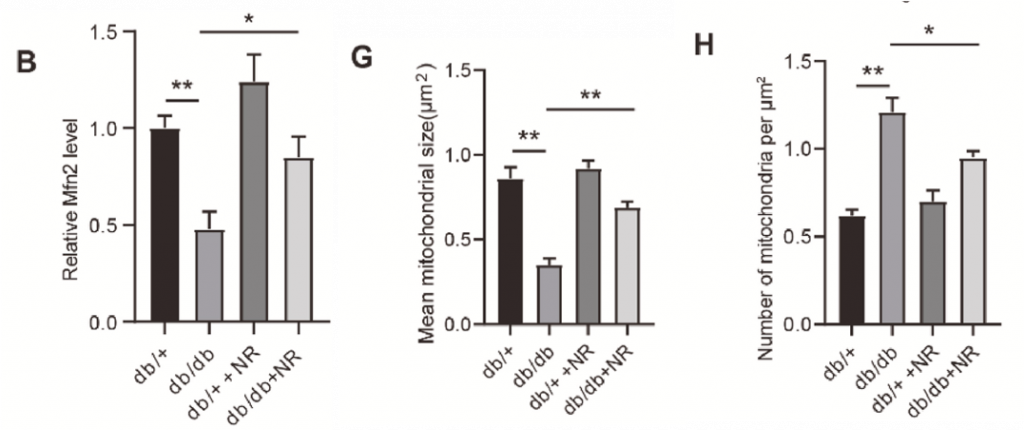Key Points:
- Diabetic mice display cardiac dysfunction and mitochondrial impairments.
- NR supplementation increases cellular NAD+ levels and helps restore mitochondrial function.
- Restoration of mitochondrial function reduces cellular (oxidative) stress, mediating the repair of cardiac function.
Our heart functions to nourish each of our cells, however, its ability to pump nutrients and oxygen can become compromised. This cardiac dysfunction is a complication of both advanced diabetes and age. As the heart requires a constant energy supply, mitochondrial dysfunction – dysfunction of the main cellular energy generator – may play a critical role in the heart’s ability to pump blood. Now, a new study out of China shows that, by enhancing mitochondria, NR may help alleviate cardiac dysfunction, particularly in diabetes.
The study, published in Free Radical Biology and Medicine, focused on diabetic mice given NR to increase their heart NAD+ levels. NAD+ has been shown to protect against age-related diseases, such as diabetes, by improving mitochondrial function and energy metabolism. The researchers found that NR supplementation promotes mitochondrial fusion, an indicator of mitochondrial health. Furthermore, NR helped suppress cellular stress and reduce cellular death within the heart tissue of diabetic mice.
“These findings suggest…oral supplementation of NR as a potential strategy for delaying cardiac complications in patients with diabetes,” the investigators wrote.
Nicotinamide Riboside Improves Cardiac Function
Mice deficient in the hormone that inhibits hunger (leptin) are commonly used to model diabetes and obesity. In the heart tissue of these mice, the scientists found decreased NAD+ levels. Furthermore, the mice exhibited impairments in heart function, including reductions in left ventricle ejection fraction (LVEF), which shows how much oxygen-rich blood is being pumped per beat. However, when given 400 mg/kg/day of NR, the diabetic mice displayed increased NAD+ levels and improved heart function.

When mitochondria are damaged, they produce more molecules (reactive oxygen species) that cause cellular (oxidative) stress, a hallmark of aging. Mitochondrial fusion helps to alleviate cellular stress by fusing partially damaged mitochondria to form undamaged mitochondria. Mitochondrial fission (division) enables the removal of damaged mitochondria and facilitates cell death during times of high cellular stress. Both processes work in conjunction to maintain cell health and function.
Prior to NR supplementation, the heart cells of diabetic mice had large mitochondria that were reduced in number, indicating increased mitochondrial fission. Following NR treatment, the mitochondria decreased in size and increased in number, indicating increased mitochondrial fusion. The scientists also found that NR increased the mitochondrial fusion protein Mfn2. This fusion facilitated a reduction in cellular stress and cell death.

Nicotinamide Riboside Supplementation for Heart Health
This study shows that NR supplementation seems to have a protective effect on diabetic heart cells via its role in promoting mitochondrial fusion. Studies have shown that NR also helps relieve cardiac dysfunction in other cardiac conditions, such as dilated cardiomyopathy (chronic heart disease) and enlarged heart (hypertrophy) in mice. There has even been a small clinical trial showing that NR positively affects heart health in patients with heart failure.
NR is an easily obtainable supplement with minimal side effects, such as nausea, fatigue, and headaches, and the evidence is mounting that it may be the key to saving our aging hearts. As always, medication and supplement changes should be discussed with your doctor.